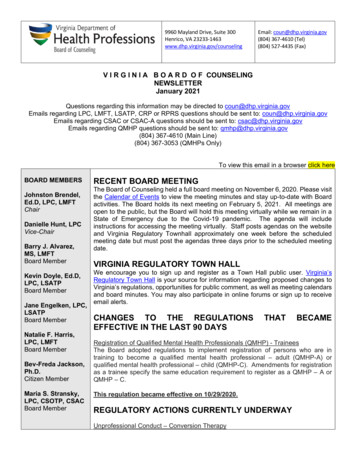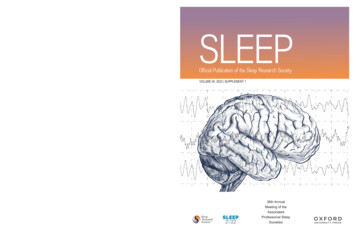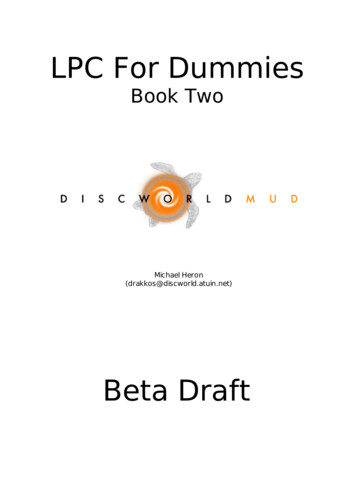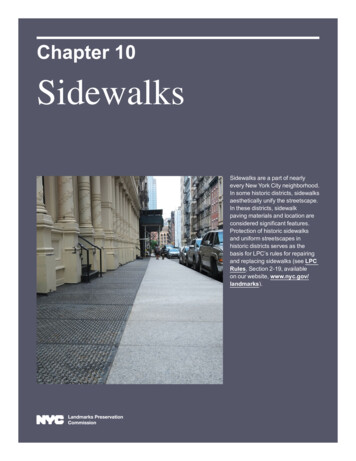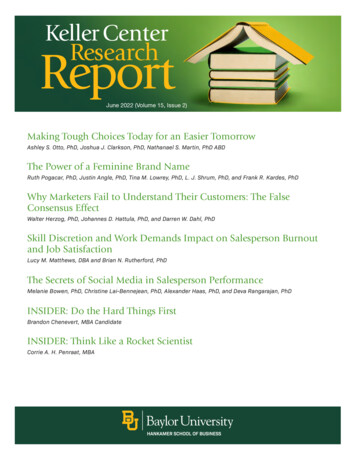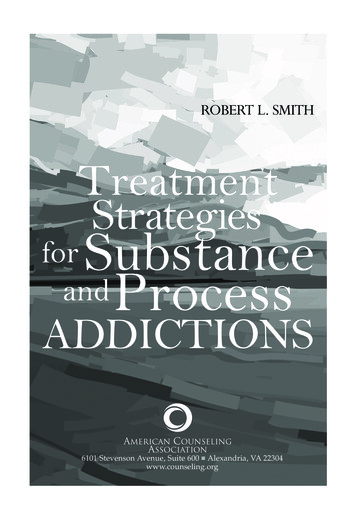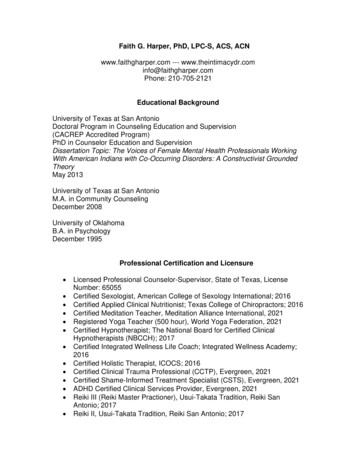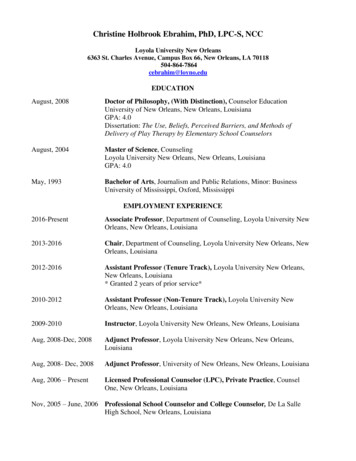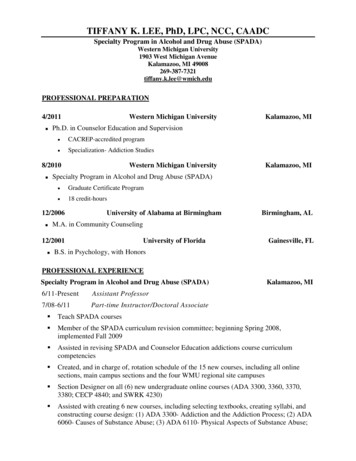
Transcription
TIFFANY K. LEE, PhD, LPC, NCC, CAADCSpecialty Program in Alcohol and Drug Abuse (SPADA)Western Michigan University1903 West Michigan AvenueKalamazoo, MI AL PREPARATION4/2011 Western Michigan UniversityPh.D. in Counselor Education and Supervision CACREP-accredited program Specialization- Addiction Studies8/2010 Western Michigan University Graduate Certificate Program 18 credit-hoursUniversity of Alabama at BirminghamBirmingham, ALM.A. in Community Counseling12/2001 Kalamazoo, MISpecialty Program in Alcohol and Drug Abuse (SPADA)12/2006 Kalamazoo, MIUniversity of FloridaGainesville, FLB.S. in Psychology, with HonorsPROFESSIONAL EXPERIENCESpecialty Program in Alcohol and Drug Abuse (SPADA)6/11-PresentAssistant Professor7/08-6/11Part-time Instructor/Doctoral AssociateKalamazoo, MI Teach SPADA courses Member of the SPADA curriculum revision committee; beginning Spring 2008,implemented Fall 2009 Assisted in revising SPADA and Counselor Education addictions course curriculumcompetencies Created, and in charge of, rotation schedule of the 15 new courses, including all onlinesections, main campus sections and the four WMU regional site campuses Section Designer on all (6) new undergraduate online courses (ADA 3300, 3360, 3370,3380; CECP 4840; and SWRK 4230) Assisted with creating 6 new courses, including selecting textbooks, creating syllabi, andconstructing course design: (1) ADA 3300- Addiction and the Addiction Process; (2) ADA6060- Causes of Substance Abuse; (3) ADA 6110- Physical Aspects of Substance Abuse;
2(4) ADA 6340- Recovery Oriented Systems of Care; (5) ADA 6400- Co-occurringDisorders; and (6) ADA 6420- Clinical Supervision in Alcohol and Drug Abuse Updated SPADA website to reflect curriculum changes In charge of revising SPADA Field Practicum Manual, Brochure, and applicationpaperwork Created various presentations for informing WMU faculty/staff of the curriculum changes Member of marketing team; assisted in marketing new curriculum on campus and branchcampuses8/14 - PresentChild and Family Psychological ServicesKalamazoo, MICounselor Private practice Complete biopsychosocial intake assessments Create and update treatment plans Provide individual counseling9/09-3/10; 1/11-9/14Behavioral Health ServicesKalamazoo, MICounselor Completed biopsychosocial intake assessments; create and update treatment plans Provided Brief Intervention sessions to college students Provided group counseling to college students (Didactic Group and Young Adult Group) Provided group counseling to women using trauma based curriculum Conducted 6 week, Alcohol Awareness, group for driving offenses Case load of 20 clients; provided individual counseling9/07-8/08Center for Counseling and Psychological ServicesKalamazoo, MIDoctoral Associate / Staff Completed psychosocial intake assessments and provided individual counseling Assisted master’s-level counselors with their practicum requirements in the clinic Managed Landro Recording System for practicum students and supervisors Provided orientation presentations to students in the beginning and at the end of eachsemester Assisted with daily operations of clinic4/05-8/07UAB Drug Free Intensive Outpatient Treatment ProgramBirmingham, ALCounselor and Student Supervisor Provided on-site supervision for master’s-level interns from UAB’s counseling program Provided group counseling for court mandated clients (4 days a week; 2 ½ hrs)
3 Provided individual counseling and treatment planning Completed biopsychosocial assessments Monitored drug screens and worked closely with the TASC program7/04-12/05Treatment Alternatives for Safer Communities (TASC)Birmingham, ALCourt Advocate TASC court representative for Criminal Circuit Court Judge Tom Nail Completed and presented reports and Alternative Sentencing Plans in court weekly Provided case management for over 100 clients, including drug screens and communitytreatment referrals Completed daily biopsychosocial assessments4/02-10/02Dept. of Children and Families (DCF)Orlando, FLChild Protective Investigator Investigated allegations of child abuse, neglect, and abandonment Interviewed family members, school officials, law enforcement, etc. Attended court when children were removed from the homeCOURSES TAUGHTSummer II 2008 – PresentWestern Michigan UniversityKalamazoo, MIUndergraduateADA 2250: Drug Use: Personal and Social ImpactMain Campus (Lecture Hall and Honors College Sections), Online, and Open LearningADA 3200: Legal and Illegal DrugsOnline SectionADA 3300: Addiction and the Addiction ProcessOnline and Open Learning SectionsGraduateADA 6330: Special PopulationsMain Campus and OnlineADA 6330: Diversity and Ethical IssuesOnline
4ADA 6340: Recovery Oriented Systems of CareMain Campus, Traverse City Campus and OnlineADA 6400: Co-Occurring DisordersMain Campus: Set to teach Spring 2015CECP 6110: Theories of CounselingOn Campus; Co-taught w/ Dr. Suzanne Hedstrom from CECP dept. as part of internship)COURSE DEVELOPMENTSPADA graduate certificate curriculum was made available through online education starting infall 2011. Created the following courses in the new format:ADA 6330: Special PopulationsADA 6340: Recovery Oriented Systems of CareSPADA curriculum was revised and implemented in fall 2009. Created the following newcourses:ADA 3300: Addiction and the Addiction ProcessADA 6060: Causes of Substance AbuseADA 6110: Physical Aspects of Substance AbuseADA 6340: Recovery Oriented Systems of CareADA 6400: Co-occurring DisordersADA 6420: Clinical Supervision in Alcohol and Drug AbuseSPADA course was revised to incorporate ethics training in order to meet State of Michiganaddictions credentialing requirements. Created the following new course:ADA 6330: Diversity and Ethical Issues in AddictionsRESEARCH AND PUBLICATIONSPeer-Reviewed JournalsLee, T. K., Craig, S. E., Fetherson, B. T. L., & Simpson, C. D. (2013). Addictions competenciesin the 2009 CACREP clinical mental health counseling program standards. Journal ofAddictions and Offender Counseling, 34, 2-15.
5Lee, T. K. (2013). Integrating a developmental supervision model with the adaptive supervisionin counselor training model. In G. R. Walz, & J. C. Bleuer (Eds.), Ideas and research youcan use: VISTAS 2013 (pp. 1-14).Lee, T.K. (2014). Addiction education and training for counselors: A qualitative study of fiveexperts. Journal of Addictions and Offender Counseling, 35(2). Publication date: October2014.Lee, T. K., & Bischof, G. (In press). Addiction training in counselor education programs: Asurvey of the current status and future plans. Journal of Addictions and OffenderCounseling.BooksLee, T. K. (2015). Embracing diversity: Treatment and Care in Addictions Counseling. CognellaPublishing. A textbook for counselors in training that focuses on diversity issues andmulticultural competency.Encyclopedia EntriesLee, T. K. (In press). Light beer. In Martin, S. C. (Ed.), Alcohol: Social, Cultural, and HistoricalPerspectives. Sage Publications. Projected publication date: 1/15/2015.Lee, T. K. (In press). Penalties for alcohol violations. In Martin, S. C. (Ed.), Alcohol: Social,Cultural, and Historical Perspectives. Sage Publications. Projected publication date:1/15/2015.Lee, T. K. (In press). Alcohol by volume (ABV). In Martin, S. C. (Ed.), Alcohol: Social,Cultural, and Historical Perspectives. Sage Publications. Projected publication date:1/15/2015.DissertationLee, T. K. (2011). Implementation of the 2009 CACREP standards addiction competencies.Doctoral Dissertation. ISBN: 9781124617183INTERVIEWSNewspaperInterviewed by Blair Yankey of the Western Herald regarding Adderall use on college campuses.Publication date: December 9, 2014. Available in hard copy and online finals-adderall-abuse/
6PRESENTATIONSNationalLee, T. (2014, May). Trauma issues among women who use substances. TraumatologySymposium: Florida Counseling Association; Sarasota, FL.Lee, T. (2013, October). Addiction counseling: Teaching students about women’s issues inrecovery. Association for Counselor Education and Supervision; Denver, CO.Heyn, M., & Lee, T. (2013, September). Seeking Safety treatment: The application to veteranswith substance abuse disorders and post-traumatic stress disorder. National Conferenceon Addictive Disorders; Anaheim, CA.Lee, T. (2012, November). The current state of addictions training: A survey of CACREPaccredited programs. Western Association for Counselor Education and Supervision;Portland, OR.Lee, T. (2012, November). Expert opinions on addictions training in counselor education:Results of a qualitative study. Western Association for Counselor Education andSupervision; Portland, OR.Lee, T. (2012, July). Sexual addiction: Screening, assessment, treatment, and the controversy ofits existence. American Mental Health Counselors Association; Orlando, FL.Lee, T. (2011, October). Chemical misuse: How to identify, intervene, engage, and managestudent impairment. Association for Counselor Education and Supervision; Nashville,TN.Lee, T. (2011, October). Faculty impairment: How to address addiction issues in counseloreducation. Association for Counselor Education and Supervision; Nashville, TN.Lee, T. (2011, March). Expert opinions on substance abuse training in counselor education:Results of a qualitative study. American Counseling Association; New Orleans, LA.Lee, T. (2011, March). The current state of substance abuse training: A survey of CACREPaccredited programs. American Counseling Association; New Orleans, LA. (ACESSponsored Session)Lee, T., & Kent, A. (2010, March). Sexual addiction: Screening, assessment, diagnostic criteria,and treatment options. American Counseling Association; Pittsburgh, PALee, T., & Hinman, B. (2010, March). Children of alcoholics and career self-efficacy:Application of social cognitive career theory. American Counseling Association;Pittsburgh, PA.
7Lee, T., & Kent, A. (2009, October). Sexual addiction: What counselor educators need to knowabout this process addiction. Association for Counselor Education and Supervision; SanDiego, CA.Lee, T., & Craig, S.E. (2009, October). Clinical mental health counseling: Implementation of the2009 CACREP standards related to substance abuse. Association for CounselorEducation and Supervision; San Diego, CA.RegionalLee, T. (2014, October). Advocacy for clients with addiction issues. North Central Associationfor Counselor Education and Supervision; St. Louis, MO.Lee, T. (2010, October). Integration of adaptive supervision in counseling training and adevelopmental supervision model. North Central Association for Counselor Educationand Supervision; Chicago, IL.Lee, T. (2010, October). Adaptive counseling and therapy: Application to substance abusetreatment. Poster Session; North Central Association for Counselor Education andSupervision; Chicago, IL.LocalLee, T. (2014, October). Alcohol use and harm reduction strategies. Presentation for students atKalamazoo Valley Community College. Kalamazoo, MI.Lee, T. (2014, May). Substance use and abuse among youth: Information on statistics,symptoms, diagnosis, and family issues. Presentation for the Ark, Baraga Manor, BridgesCounseling, and the Catholic Charities Diocese of Kalamazoo. Kalamazoo, MI.Lee, T. (2012, October). Women’s Issues in Addiction and Recovery. Fetzer Center. ComingTogether Conference. Kalamazoo, MILee, T. & Blevins, G. (2012, October). Advanced Treatment for Substance Abuse. Fetzer Center.Coming Together Conference. Kalamazoo, MI.Lee, T. (2012, February). Koinonia: Race Symposium. Invited Panel Member to speak on raceissues in the community of Benton Harbor, MI.WMULee, T. (Fall 2011 and Fall 2012). Alcohol Use Among College Students. Invited to speak inHNRS 1015 course.
8INVITED PRESENTATIONSLee, T. (2011, March). Addictions training in CACREP-accredited programs: Results of amixed-method study. Graduate Student Carousel for the International Association forAddictions and Offender Counseling. American Counseling Association; New Orleans,LA.Lee, T. (2012, August). Millennials in the Workplace. United Auto Workers Conference.Onaway, Michigan. A 4-hour presentation.LICENCES AND CERTIFICATIONSLicensed Professional Counselor (LPC) # 6401012225National Certified Counselor (NCC) # 253168Certified Advanced Alcohol and Drug Counselor (CAADC) # C-02469Specialty Program in Alcohol and Drug Abuse (SPADA) CertificateGraduate Certificate at WMU; 18 credit-hour program; completed in 8/2010SERVICE2014- PresentCHHS College Curriculum CommitteeReview curriculum proposals for the various programs in the College of Health andHuman Services.2014- PresentLee Honors College Thesis JudgeListen to and participate in the discussion of students’ theses presentations in the HonorsCollege. An evaluation of each student is completed based on several factors includingstrength of research, analysis of data, quality of presentation, etc.2013- PresentWMU Graduate Student Travel Grant CommitteeReview and evaluate graduate student applications for travel grants to conferences.Students submit applications for conferences where they present on their research.2013- PresentLee Honors College Medallion Scholar EvaluatorThe Medallion Scholarship is worth a total of 50,000 and is awarded to a minimum of20 students. Invited freshman compete for this scholarship through a series of activities,consisting of an essay and group problem solving session, as well as a Medallion ScholarStudent Panel and Academic College Showcase.2012 – PresentWMU AlcoholEdu CommitteeInitiated by the President with the goal of educating WMU’s incoming freshman onalcohol consumption. AlcoholEdu is an online prevention program designed to reducerisk behaviors associated with alcohol use. Committee members designed andimplemented program and use data for norming and research purposes.
92012 – PresentComing Together Conference CommitteeThis yearly addiction conference is put on by Community Healing Centers and the DrugTreatment Court Foundation of Kalamazoo County. SPADA is involved in the planningand funding.2012 – PresentWMU Physician’s Assistant Program Interview CommitteeParticipate twice yearly in the interviews for the Physician Assistant Program.2009 – PresentWMU Alcohol Advisory BoardThe goal of the Alcohol Risk Reduction program is to provide comprehensiveprogramming and resources for the prevention and reduction of alcohol related harms onWestern Michigan University’s campus. The Alcohol Advisory Board consists ofdepartmental faculty, clinicians, student groups, law enforcement, and communitymembers. The board members collaborate and implement research, develop resources,and provide training2011 – 2014WMU Faculty Senate Committee on Extended University ProgramsServed as the advising group to the Faculty Senate and the Associate Provost for EUP onall aspects of EUP and online education.2011Hilltop Review-WMU Journal of Graduate ResearchInvited editor; edited an article on co-occurring disorders submitted for publication2010Academic Program Planning ReportCollege of Health and Human Services; Specialty Program in Alcohol and Drug Abuse.2009 – 2008WMU SPADA Curriculum Revision BoardSubmitted six new undergraduate courses and seven new graduate courses. One of eightco-authors and final editor.THESIS AND DISSERTATION COMMITTEES2013- PresentDissertation Committee- Devin Jordan; Counseling Psychology2012- May 2014Thesis Committee- Cole Molnar; Lee Honors College; The NFL: Growinginto its death. Successfully defended.PROFESSIONAL MEMBERSHIPS2008- Present2008- Present2008- PresentAmerican Counseling Association (ACA)Association for Counselor Education and Supervision (ACES)International Association of Addictions and Offender Counselors(IAAOC)
10GRANTS AMBRF/Foundation for Alcohol Research – New Investigator GrantServing as principal investigator on a grant requesting funding to gather data oncollege drinking and the validation of intervention tool I created named DARN-CS.Application deadline: Feb. 15, 2015. ACES Research Proposal Grant (2010)Amount funded: 909.00. Grant received for dissertation, Implementation of the 2009CACREP Standards Addiction Competencies. Graduate Student Travel Grant (2010)Amount funded: 700.00. Grant received by Graduate College to present at the ACAconference in 2011. Ranked 3 out of 19 applications. Rated 4.13 out of 5.0.HONORS AND AWARDS Honors College Teaching Fellow Award (2012)Awarded to a faculty member for teaching excellence in the WMU Honors College. All-University Teaching Award (2011)Awarded to nine doctoral students at the University in 2011. International Addictions and Offender Counseling (IAAOC) Graduate StudentScholarship (2011)Awarded 250; Two recipients yearly. Graduate Teaching Effectiveness Award (2011)Dept. of Counselor Education and Counseling Psychology; WMUAwarded to one doctoral student in the Department yearly. Rising Star Award (2010)College of Education and Human Development; WMUAwarded to one doctoral student in the College yearly. Outstanding Doctoral Student in Counselor Education Award (2010)Dept. of Counselor Education and Counseling Psychology; WMUAwarded to one doctoral student in the CE program yearly. Florida Academic Scholarship (1998)Full tuition and books for 4 years; Based on academic achievement. Walt Disney Scholarship (1998)Full tuition and books for 4 years; Based on academic achievement.Awarded to one student in 15 school districts.
11 Ray and Anna Martin Scholarship (1998)Awarded 6000; Based on essay and academic achievement. Gator Scholarship (1998)Awarded 1,000 towards tuition at the University of Florida; Based on academicachievement.DOCTORAL PRACTICA AND INTERNSHIPS1/08 - 5/08Doctoral PracticumIndividual CounselingCenter for Counseling and Psychological Services - Kalamazoo, MIClinical1/09 - 5/09Doctoral PracticumIndividual and Group SupervisionCenter for Counseling and Psychological Services - Kalamazoo, MISupervision9/09 – 3/10Doctoral InternshipBiopsychosocial Assessments; Individual and Group Counseling.University Substance Abuse Clinic - Kalamazoo, MI1/10 – 4/10Doctoral InternshipCECP 6110, Theories of Counseling.Western Michigan University - Grand Rapids, MIClinicalTeaching
ADA 6060: Causes of Substance Abuse ADA 6110: Physical Aspects of Substance Abuse ADA 6340: Recovery Oriented Systems of Care ADA 6400: Co-occurring Disorders ADA 6420: Clinical Supervision in Alcohol and Drug Abuse SPADA course was revised to incorporate ethics training in order to meet State of Michigan addictions credentialing requirements.

